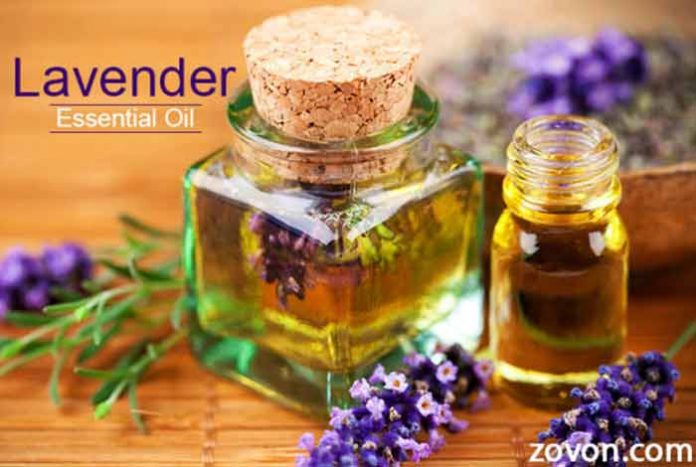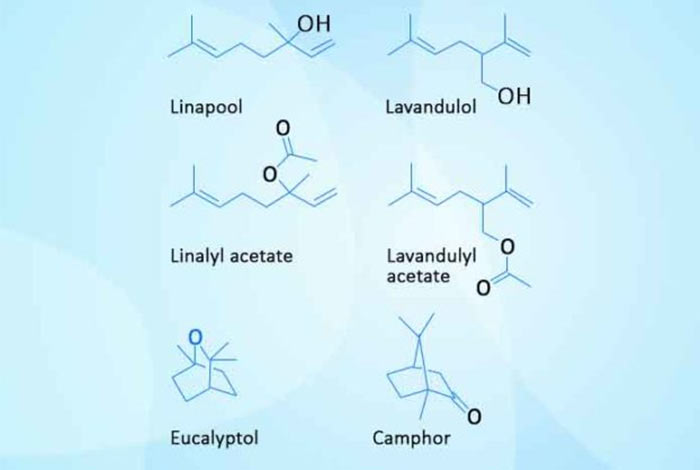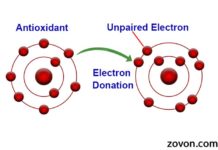
Essential oils are derived from plants and are volatile hydrophobic liquids with a distinct aroma and characteristic properties of that plant. These oils have been used medicinally since medieval times.
Some of the common essential oils are lavender oil, peppermint oil and tea tree oil. These essential oils may be used fighting against skin aging and many health conditions.
Lavender essential oil is a colorless oil and has been used for many years in perfumes and cosmetics. It has a fresh, sweet and floral aroma that is very soothing. Lavender oil is isolated from lavender plant (Lavandula angustifolia) It is obtained by steam distillation of the lavender buds and flowers. It is insoluble in water and is a complex chemical compound. Lavender oil is known for relieving problems like stress, headaches, depression and anxiety. It is also used in aromatherapy as well as in manufacturing perfume. Lavender plant is more commonly found in the Himalayan regions. Lavender oil has antioxidant and antibacterial properties.
Structure of Lavender Oil:

Phytochemicals such as a-pinene, limonene, camphor, lavandulyl acetate and 3-octanone are the main components of lavender oil. 5-Dimethyl-1-vinyl-4-hexenyl butyrate makes around 45% of the composition.
Spike Lavender Oil is the best variety of lavender oil and is obtained from a special species of lavender called as spike lavender (Lavandula latifolia). This type of lavender oil has a sharp smell due to a high percentage of camphor in it. In India, nice quality spike lavender oil is produced in J&K. The other common sources of lavender oil are Lavandula angustifolia and Lavandula -x-intermedia.
Below table suggests chemical composition of Lavender Essential Oil:
Component |
Percentage |
|
1,5-Dimethyl-1-vinyl-4-hexenyl butyrate |
44% |
|
1,3,7-Octatriene, 3,7-dimethyl- |
26% |
|
Phellandrene |
0.09% |
|
S–Pinene |
0.3% |
|
Camphene |
0.27% |
|
Linalool Oxide Trans |
0.3% |
|
camphor |
3.79% |
|
6-Octadien-1-ol, 3,7-dimethyl-, acetate |
1.42% |
|
Eucalyptol |
7.32% |
Uses of Lavender Oil:
 Alleviates anxiety:
Alleviates anxiety:
Lavender oil plays an important role in reducing anxiety. Patients suffering from anxiety attack can sniff lavender oil and effects can be seen in as less as 10 seconds. It is a sedative. Since Lavender Oil has therapeutic properties and as it induces relaxation so it proves to be an effective medication in the treatment of disorders related to the nervous system. It also activates the depressed nervous system
Reduces hair loss:
Lavender oil when applied to the scalp, increases blood circulation and promotes hair growth. It is also used in the treatment of dandruff and lice. It is often used as a conditioner. One must use at least 10-15 drops of lavender oil to notice a reduction in hair fall. It can be applied along with other essential oils which act as carrier oils. Massaging the scalp after hot oil treatment of lavender oil gives excellent results.
Acne:
Lavender Oil has an exfoliating effect on the skin. It also helps with reducing acne and redness as it has a rubefacient effect. For treatment of acne, lavender essential oil must be diluted with equal amount of jojoba oil before application on skin. Lavender oil doesn’t have much effect on new breakouts but it helps in reducing the chronic acne. Lavender oil being bactericidal in nature kills harmful skin bacteria and thus helps in managing acne.
Diminishes headaches and body pains:
Lavender oil is analgesic in nature and is used as an alternative medicine to treat headaches and body pains. Sniffing just a few drops of lavender oil works wonders even for chronic headaches and migraines. Massage with lavender oil leads to a reduction in pain in back, neck and shoulders. It relieves pain by increasing blood circulation in the applied area and due to its natural soothing properties.
Relieves insomnia:
Lavender oil is very helpful in patients with insomnia. It calms the mind and reduces restlessness.
Act as an antioxidant:
To reduce damage caused by free radicals, lavender oil can be used as a natural antioxidant which oxidizes free radicals. Lavender essential oil is a powerful antioxidant support. It is useful in combating the oxidative stress caused due to free radicals.
Treatment of diabetes:
Use of lavender oil protects the body from diabetes. It decreases high blood sugar levels and is helpful in metabolic dysfunction. Lavender Oil balances high blood sugar levels. Lavender Oil improves sensitivity to insulin and works to ease the symptoms of diabetes.
Stress reduction and mood enhancement:
Use of Lavender oil reduces stress and post-natal depression. It is also useful in recovering from trauma. Since lavender has a very calming effect so it is used by patients experiencing chronic stress. The use of lavender increases the slow wave activity and reduces the intensity of low moods.
Useful for brain disorders:
Lavender Oil is useful in the treatment of Alzheimer’s disease. It reverses symptoms of stroke. Inhalation of lavender oil is useful in treating brain cancers. Two phytochemicals in lavender oil called Perillyl alcohol and Linalool have cytotoxic and apoptotic activities thus helping in the treatment of cancers. Lavender oil is also used in aromatherapy along with other therapies to better manage the quality of life in cancer patients as it has a very calming and relaxing effect on our nervous system.
Helps in treatment of eczema:
For decreasing the symptoms of eczema and prickling sensation one can use lavender oil. It is useful in Skin Detoxification. Lavender Oil fights against harmful and toxic pollutants and checks/stops the growth of bacteria on the skin. It increases the amount of oxygen getting transported to the skin thereby increasing skin firmness and renewing the old skin.
Since Lavender Oil shows anti-inflammatory properties so it helps in healing burns by acting as a catalyst.
Used as insect repellant:
Lavender oil has been long used for treating insect bites. It is also used in the protection of clothes from insects and moths. It also helps in preventing infections caused by bites from insects and bugs. It is also known for controlling itchy sensation.
Decreases muscle soreness:
Lavender Oil is used in the treatment of tired muscles particularly foot and head muscles. It is used as an antiseptic. Lavender essential oil can be applied to wounds as it is useful in fighting against infections. It can be mixed with a carrier oil like camphor and applied. It is also a great treatment for muscle soreness after workouts.
Helpful to digestion:
Lavender tea helps in indigestion and stomach disorders. It helps in releasing of juices in the stomach and increases the food mobility. It promotes digestion and nutrient absorption and helps in getting rid of waste products. It is a healing material known for keeping the digestive tract healthy.
Side Effects of Lavender Oil:
- Lavender oil can result in a sensitivity of skin and reactions in the skin. It can sometimes be toxic resulting in depression of the central nervous system.
- If ingested in quantities more than prescribed, it can result in vomiting and anorexia nervosa. Its excess use can also lead to bad stomach and gastrointestinal issues.
- The topical application that is an application to body surface may result in tingling sensation. If it is used in very high concentrations it may result in damage to the liver and other organs.
- It is also possible that, after sprinkling the oil if you go out in the sunlight, it may cause phototoxicity. Thus, there are safety concerns associated with a not so proper use of lavender oil.
FAQs: What people normally want to know about Lavender Essential Oil?
1. How can I make lavender oil at home?
You can use dried lavender flowers for this purpose. Take some dried lavender flowers and crush the leaves. Do not use water. In fact, use olive oil or almond oil. Subject the mixture to sunlight. If sunlight is not available, heat the oil. The oil can thus be extracted by a sieve after straining,
2. Can I use lavender oil on my skin?
Yes, Lavender Oil can be used for all skin types as it helps get rid of dead skin and rejuvenates it. One of the main components of lavender oil is Linalool. Linalool compounds are known for their positive effect on the skin which helps in all skin related issues.
3. How lavender oil helps hair?
Lavender Oil, when applied to the head, promotes hair growth and prevents hair loss related conditions like baldness. It can be used on any type of hair. It also brings about a lustrous effect on dry hair.
4. How do I use lavender essential oil?
Lavender Essential oil can be applied to skin with or without a carrier oil. It can also be applied to hair. Always use therapeutic and medicinal grade oil. Make sure your oil is true lavender and not Lavandin, which is a cheaper essential oil and has no such healing properties.one more word of caution, never apply it near eyes or inside ears.
5. Can I take lavender oil orally?
Lavender Oil can be taken orally. It is nearly as effective as benzodiazepines for treating anxiety. However, the right amount of dosage may be checked with a physician before consumption. Also, it is advised to read internal usage instructions which specify whether it is safe or not.
6. How often should Lavender essential oil be used?
It can be used on a need basis. It is important not to take overdoses of lavender essential oil. The best time for application is the night before sleep. Lavender oil can be messaged directly into skin and it takes 20 minutes to absorb it into our bloodstream. It can also be inhaled directly from hands or used in a cool mist diffuser.
7. Can lavender essential oil be used for children? If yes, how?
Lavender essential oil can be used on children in dilute form. It can be applied on their scalp or on the bottom of their feet through which it can easily enter their skin.
8. Is lavender oil safe during pregnancy?
It can be used as an agent in aromatherapy. However internal use must be avoided.
9. What must necessary precautions be taken during application of lavender Oil?
A skin test may be performed. If irritation is caused, the application must be stopped. It can be used in the dilute form and should not be applied near or in the eyes.










